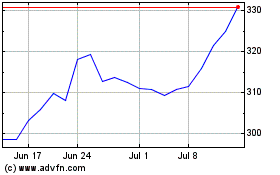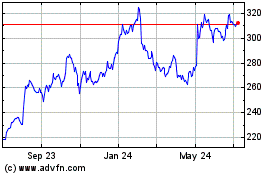Amgen Researchers Discover Gene Associated With Lower Risk of Heart Disease
May 18 2016 - 5:44PM
Dow Jones News
By Ron Winslow and Jonathan D. Rockoff
Researchers from Amgen Inc.'s deCode genetics unit said they
have discovered a rare genetic variation that is associated with a
34% lower-than-average risk of heart disease, potentially opening
up a new front in the battle against the world's leading
killer.
Carriers of the variant, in a gene called ASGR1, had
substantially lower levels of harmful cholesterol, which
researchers said likely accounted for a portion of the lower heart
risk.
Amgen is now working on several potential agents designed to
mimic the effect of this genetic trait in hopes of converting
discovery of a rare mutation into a drug that could have broad
impact against a common disease. It expects to begin testing one of
the candidates in people within two years.
The variant was found in one of about 120 people in the study
and was associated with an additional year of life. A second much
rarer variant of the same gene was also linked to lower harmful
cholesterol.
Despite its link with lower cholesterol, the gene isn't
associated with other known cholesterol-related mechanisms, fueling
hope that an effective drug might further reduce risk of heart
disease beyond reductions achieved with cholesterol-lowering drugs
called statins.
"We have a mutation in a gene that is in a different pathway
than the one people usually look at in cardiovascular disease,"
said Kari Stefansson, deCode's chief executive. He is senior author
of a report on the discovery published online Wednesday by the New
England Journal of Medicine.
DeCode, based in Reykjavik, Iceland, has accumulated a huge
database of genomic and health data of Icelanders. Researchers
discovered the role of the genetic anomaly by analyzing the data
and then replicating the results by extending the analysis to
300,000 people in the U.S., United Kingdom and other countries.
The finding underscores the power of a new, big data approach to
drug discovery: using computers to analyze huge genomic databases
to identify potential drug targets.
Amgen is among several drug companies betting that big data can
help make sense of the flood of data from genetic sequencing and
electronic health records in a high-tech effort to find the
molecular roots of disease.
Biogen Inc., Roche Holding AG's Genentech unit and Regeneron
Pharmaceuticals Inc. are also poring over the vast data sets to
uncover rare genetic changes that appear to have a big health
impact.
Discovery of a potential drug target like ASGR1 "is exactly what
we had in mind" when the company acquired deCode in 2012, said Sean
Harper, Amgen's chief of research and development.
The genetic hitch in ASGR1 is what scientists call a
loss-of-function variant, which essentially means the gene isn't
active in people who have the mutation. Amgen's experimental
compounds are designed to block the effects of a normal ASGR1 gene
to achieve a similar effect.
"It turns out in drug development it's a lot easier to
inactivate proteins than activate them," said Dr. Harper. "If you
want to inactivate a drug target, there generally are more ways to
do that and your probability of success is higher."
Whether blocking the impact of a normal gene will have
troublesome side effects won't be known until it is tested in
people, researchers said. But Dr. Stefansson said people with the
variant didn't have any apparent health problems and they had a
slightly longer lifespan on average, based on the findings.
A normal ASGR1 gene is present in a large segment of the general
population, making it an attractive drug target.
Much genetics research is focused on disease-causing genes. The
new research underscores the value finding mutations that protect
people against illness, said Eric Topol, a cardiologist and
director, Scripps Translational Science Institute, La Jolla,
Calif., who wasn't involved in the research. "This is quite an
important paper," he said.
With the expectation that millions of people will have their
genome sequenced over the next decade, Dr. Topol said, it is likely
many more rare genetic variants that protect against heart disease
and other medical conditions will be discovered.
The research was funded by the National Institutes of Health and
other organizations.
Write to Ron Winslow at ron.winslow@wsj.com and Jonathan D.
Rockoff at Jonathan.Rockoff@wsj.com
(END) Dow Jones Newswires
May 18, 2016 17:29 ET (21:29 GMT)
Copyright (c) 2016 Dow Jones & Company, Inc.
Amgen (NASDAQ:AMGN)
Historical Stock Chart
From Mar 2024 to Apr 2024

Amgen (NASDAQ:AMGN)
Historical Stock Chart
From Apr 2023 to Apr 2024
